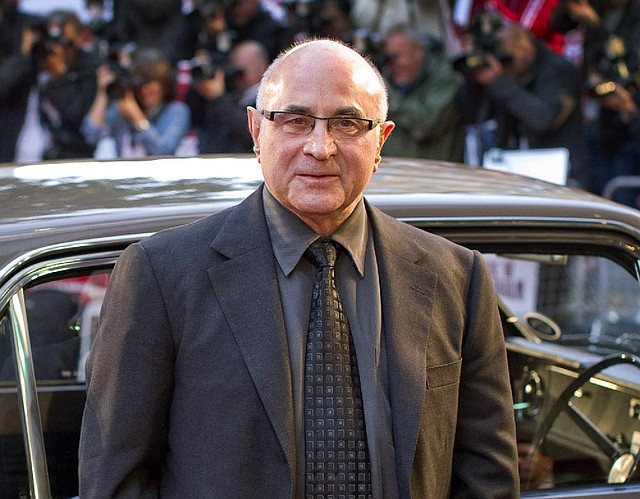British film, TV, stage star Hoskins dies
Bob Hoskins, whose roles ranged from Mona Lisa to Who Framed Roger Rabbit, received numerous prestigious acting awards over his four-decade acting career.
Thursday, May 1, 2014
Correction: Bob Hoskins, the late British film star, received a 2010 International Emmy Award for episodes of The Street that aired in 2009. This New York Times obituary gave an incorrect year for the episodes.
Bob Hoskins, the British film star who brought a singular mix of charm, menace and Cockney accent to a variety of roles, including the bemused, live-action hero of the largely animated Who Framed Roger Rabbit, has died at 71.
Publicist Clair Dobbs released a statement by his family Wednesday saying he had died in a hospital, where he had been treated for pneumonia. No other details were given. A much-honored, Oscar-nominated actor, Hoskins had announced his retirement in August 2012 after learning he had Parkinson’s disease.
Hoskins, who had virtually stumbled into acting, found early acclaim as the kind of ruthless British gangster he played in 1980 in his breakthrough feature, The Long Good Friday, and later in Neil Jordan’s 1986 film Mona Lisa, which earned him an Academy Award nomination for best actor. But his filmography also included more playful roles. He was the pirate Smee in two variations of Peter Pan - Steven Spielberg’s 1991 Hook and the 2011 British TV production Neverland. He played Cher’s unlikely love match in Mermaids (1990). And he voiced Charles Dickens’ Old Fezziwig in the 2009 animated version of A Christmas Carol, directed by Robert Zemeckis.
It was Zemeckis who cast Hoskins as the pulp-fictional, cartoon-hating detective Eddie Valiant in the landmark hybrid Who Framed Roger Rabbit, in which Hoskins shared the screen with animated characters, including the voluptuous Jessica Rabbit, voiced by Kathleen Turner.
Hoskins received a number of prestigious acting awards over his four-decade career, including the Bafta, Golden Globe and Cannes Film Festival prize as best actor for Mona Lisa, in which he played an ex-convict hired by a crime boss to act as chauffeur and unlikely bodyguard for a high-priced call girl (Cathy Tyson). He also received an International Emmy Award for The Street (2006); the Canadian Genie award for director Atom Egoyan’s Felicia’s Journey (1999), based on the William Trevor novel; and a Screen Actor’s Guild nomination as part of the cast of Oliver Stone’s 1995 Nixon, in which he played J. Edgar Hoover.
Survivors include his wife, the former Linda Banwell; their children, Rosa and Jack; and two children, Alex and Sarah, from his first marriage, to Jane Livesey.
Robert William Hoskins was born Oct. 26, 1942, in the historic Suffolk town of Bury St. Edmunds, to which his mother, Elsie Lillian, had been evacuated during heavy bombing in World War II. An only child, he was reared in London, where his father, Robert, was a bookkeeper and his mother was a cook at a nursery school.
Leaving school at 15, he worked as a porter, truck driver and window cleaner. He took a course in accounting but dropped out.
Then, in 1968, he accompanied a friend to an acting audition where he was mistaken for a candidate and was asked to read for a part. He was offered the lead.
He would find success on television, in Dennis Potter’s 1978 BBC mini-series Pennies From Heaven; on stage, playing Nathan Detroit in the wildly successful 1982 Richard Eyre-directed revival of Guys and Dolls at London’s National Theatre; and in film, in Mona Lisa as well as Terry Gilliam’s Brazil (1985) and Francis Ford Coppola’s The Cotton Club (1984), in which he played the British-born gangster Owney Madden.
In the mid-1990s, however, came projects that he considered the low points of his career. In one, he replaced Danny DeVito in Super Mario Bros., a 1993 film he dismissed as “a nightmare.” (He once joked that DeVito might play the title role should a movie ever be made about Hoskins’ life.) Another disappointment was The Secret Agent, Christopher Hampton’s 1996 adaptation of the Joseph Conrad novel. Hoskins blamed 20th Century Fox for not adequately supporting the film, which drew poor reviews.
One of the more widely circulated anecdotes about Hoskins involved a film he wasn’t in at all - Brian De Palma’s The Untouchables (1987).
During preparation for filming, Hoskins had been asked to go to Los Angeles to talk about playing Al Capone, a part that eventually went to Robert De Niro. In fact, as Hoskins told the story, De Palma was quite straightforward about the fact that he really wanted De Niro, but that De Niro’s price was creating consternation at Paramount. Hoskins was engaged as a backup, in the event that the studio could not come to terms with De Niro.
Sometime afterward, Hoskins received a check for about $34,000 and a thank you note from De Palma.
“I phoned him up,” Hoskins recalled, “and I said, ‘Brian, if you’ve ever got any other films you don’t want me in, son, you just give me a call.’”
Front Section, Pages 2 on 05/01/2014
